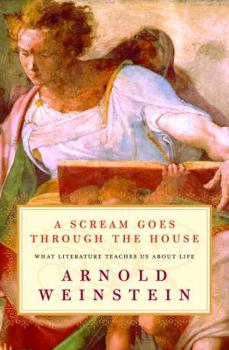A Scream Goes Through the House: What Literature Teaches Us about Life
Select Format
Select Condition 
Book Overview
"For too long we have been encouraged to see culture as an affair of intellect, and reading as a solitary exercise. But the truth is different- literature and art are pathways of feeling, and our... This description may be from another edition of this product.
Format:Hardcover
Language:English
ISBN:0375506241
ISBN13:9780375506246
Release Date:August 2003
Publisher:Random House (NY)
Length:423 Pages
Weight:1.80 lbs.
Dimensions:1.5" x 6.5" x 9.7"
Customer Reviews
4 ratings
Read This And Your Perspective Will Never Again Be The Same
Published by Thriftbooks.com User , 20 years ago
Weinstein's observations are like those moments you have in life where for an instant, a fog of clarity fills your heart and mind. He is that mist of understanding you cannot describe, and best of all he is accessible in portable paperback. I am currently a student of his and he gives a reader the tools of a new set of eyes that you put together by yourself as you learn. Why do we read things? Weinsteing will lead you to your own answer, and reading will never be the same. ...literature's LSD with no harmful side effects.
Modernity and the Doom of Consciousness
Published by Thriftbooks.com User , 20 years ago
As a real fan of Arnold Weinstein's terrific lectures on both American and World Literature (from the Teaching Company, but which I borrow from my library), I had high expectations for this book. My expectations were exceeded. That's because in the lectures, Dr. Weinstein focuses almost exclusively on literature. That's not a bad thing. It's a solid traditional approach. But in this text he is also free to draw in art, theater and film where appropriate, and to treat his material thematically, instead of on a book by book basis, a practice which tends to marginalize overall thematic observations. Also, in this format Dr. Weinstein can engage in digressions, and not worry about taking up too much time doing so, as he might in a lecture situation. Here's an example of a short digression that I found particularly insightful: "One of the ironies of modern culture is its peculiar treatment of high art. Either we subject it to the rigors of modern critical theory, so as to disclose the hidden ideological arrangements it contains; or we piously commit it to the scholar's care, with the implicit view that we "laypeople" do not have the tools of access to frequent such work with any degree of profit. It would be better if we taught our students to view all art as fair game, to approach the most formidable and hermetic works as an aspiring thief might; with intent to break and enter, to discover, steal and possess what is there." Page 334.Summarizing his insights at the end of this highly engaging text, he meditates on the tragedy of modernity, which he sees as a surfeit of consciousness combined with a lack of human connection. Weinstein illustrates this observation most dramatically through Faulkner's Quentin Compson. First, he cites Robert Penn Warren as having gotten it right when he said that it is not that Quentin suffers from a consciousness of doom, but rather the doom of consciousness. Hamlet was perhaps the first hyperconscious modern, and Weinstein does a fine job of showing how Hamlet and Quentin are connected, too. Implicit in this, at least in my opinion, is that hyperconsciousness has been promoted by the consumer society. It has filled the world with things, variations of things upon things, filling up our lives with endless vexed choices and in so doing both stokes and attempts to put out the fire of hyperconsciouness. In either case we are seduced into ignoring the fast beating heart of our own humanity as this world of things muffles the scream that goes through the house of our bodies and consciousness.
Brilliant!
Published by Thriftbooks.com User , 21 years ago
Weinstein reminds us why we read--to access alien subjectivities and begin to understand the world in which we live. This beautifully written book legitimizes the discipline of English and compels us to marinade in and reflect on the fascinating phenomenon of consciousness.
Great Book
Published by Thriftbooks.com User , 21 years ago
Professor Weinstein is one of the great teachers of literature, and one of the great humanists as well. His new book offers a compelling approach to literature, one that is not common in the academy by trying to de-intellectualize the reading of literature by connecting it to living, not thinking, our lives. His interpretations of Edward Munch's art are particularly compelling and novel, while his readings of literary works such as Toni Morrison's BELOVED are original and make one want to run out and read the book immediately. This is a completely original and human book and I recommend it highly.





